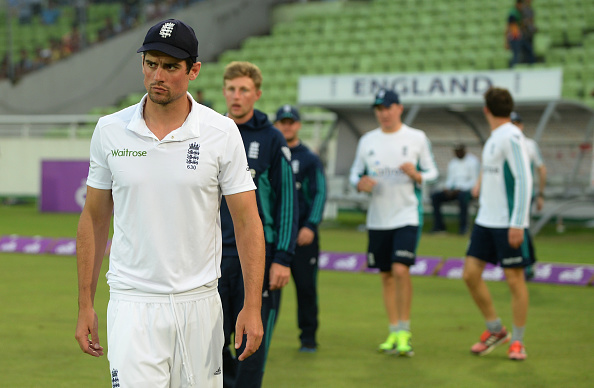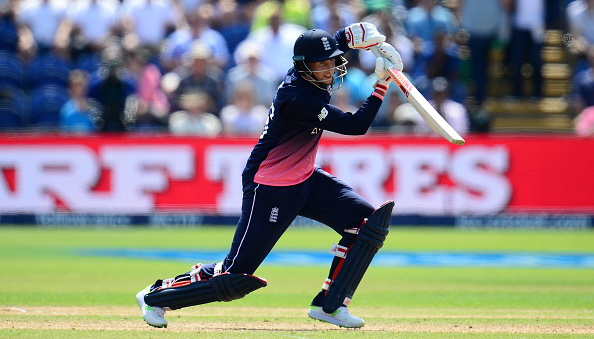
Why Stuart Broad could have been chosen as England’s Test captain
Critics expected his resignation, and he did not disappoint. Alastair Cook now has lighter shoulders after surrendering the England Test captaincy, a role he had embraced for more than four years.
Cook had met his former captain and opening partner Andrew Strauss, who is now the Team Director, as far back as January to discuss his future as the leader of the red-ball team. In India last winter, though, the coaching staff had expressed a strong willingness for Cook to continue at least until the conclusion of the 2017-18 Ashes in Australia.
"If he chooses to step down it would be a shame because we want him to carry on. We've planned, and have been planning, for Cook to be captain going to the Ashes in Australia next winter. Personally, I hope that continues,” assistant coach Paul Farbrace had said in simple terms post England’s defeat in the final Test in India the previous December.
Sadly, for Farbrace – and at least for head coach Trevor Bayliss – that ‘shame’ has taken place with Cook relinquishing the captaincy. After 59 Tests in charge – an England record – the bulky left-hander from Essex has put down his papers, and perhaps inevitably so. Cook appeared weary from leadership – and multiple losses – in the immediate period before his resignation, which notably included a first Test defeat to Bangladesh and a 0-4 hammering in India.
Also read: Challenges that Joe "Captain" Root will be facing
After much discussion, when the official confirmation arrived, it was the favoured and the more popular choice of Joe Root that Strauss and the rest of the team management befitted. Perhaps the most obvious candidate from outside, a surging Root, deputy to Cook for a respectable period of time, won their votes with his vim and young enthusiasm.
"He is universally respected by his team-mates, passionate about driving the Test team forward and extremely excited about the prospect of leading his country,” Strauss had said while announcing Root as England’s new Test captain.
Undoubtedly, he has the game to excel in all conditions – Root already averages over 50 across Tests in five countries, including the UAE – and the will to come out on top. He boasts of a flawless technique and a supreme character mingled with an imperious temperament which led him to be tipped as a future captain since his early days as an England cricketer.
Over time, the maturity he has gained has been the broad highlight of his decorated career so far. Right from his debut on a dull surface in Nagpur in 2012, where he batted astutely for 229 balls while grinding out 73 runs, to his latest triple-figure knock – also in India – in England’s previous series, Root has forever been a thorn in the flesh of opposition bowlers who have often been foxed by the childish grin on his boyish face.
Still not five years into an international career, Root has won hearts across the world with glamorous drives, and is dependent more on playing along the ground rather than in the air, a rare quality to possess in the modern day of slam-bang batting.
The other candidate running the captaincy race was the Nottinghamshire pacer Stuart Broad. A fearless warrior by nature, Broad has captured the eyes of fast bowling aficionados for over a decade at the highest level.
With the venom redolent of an aggressive new ball bowler, Broad brings pace as well as accuracy to the table. He swings the new ball masterfully in the company of his elder partner James Anderson, and can cause havoc with the old ball as evidenced by the fact that he rejoices in the glory of having claimed five wickets in a single spell on seven occasions.
Using his height to good effect, Broad can extract bounce from the most unresponsive of tracks, and his teasing seam movements are as effective as Anderson. Broad crumbled Australia on his home ground, Trent Bridge in 2015, claiming a staggering career-best 8/15, and blowing the visitors away for a shameful 60 in an innings that barely lasted 19 overs.
But the alarm bells had long been ringing. By then, Broad was already known to breathe fire, having made a name for himself on the West Indies tour of 2009 and the Ashes a few months later, where he first got 6/91 at Headingley, and then bagged 5/37 at The Oval, a spell which put England on track to win the series 2-1.
Other golden memories from Broad include a hat-trick against India in 2011 – also at Trent Bridge – and a fearsome outing against West Indies at Lord’s in 2012 that saw him grab 7/72.
A workhorse in the shadows of Anderson, the 31-year-old has garnered accolades with a mindset of a buoyant fighter. Though Anderson was the first Englishman to claim 400 Test wickets, Broad, with 368, is fast heading in the direction of eclipsing Sir Ian Botham who has 383.
His most testing tour came in 2013 when England travelled to Australia for an Ashes series, with local fans still feeling the pain of Broad’s stubbornness to not walk after a clear edge during the Trent Bridge Test earlier in the year.
Come the first Test, and posters in Brisbane read: “Stuart Broad, I know what you did last summer”. But Broad shut them up with 6/81 in the first innings, subsequently leaving Australian shores with 21 wickets – the only English spark on an otherwise forgettable tour.
Two years later, down south again, Broad produced a magical spell of 5 for 1 in Johannesburg which eventually ended at 6/17. That win sealed the series for England and further confirmed Broad’s appetite for success.
At 31, to invest in Broad as a leader was a gift English cricket perhaps missed. With nearly 11 years in the England dressing room and 102 Tests to his name, the sturdy fast bowler provided Strauss and company with an ideal mix of experience and blitzkrieg. He has led the T20 side in the past – Broad was captain from 2011 to 2014 before Eoin Morgan was handed over the duties in 2015 – and has seen more of the world than the eventual winner Root, who has only played 53 Tests.
Broad still has at least a good, healthy four or five years of cricket in him and to trust him with the leadership would not have been just a simple short-term goal. If Root, at 26, is seen jostling with responsibility other than the number three batting position in two years’ time, it would be too late for England to think of Broad again. On the other hand, if Broad is found struggling, the selectors and the management would still have Root, only 28, with much more international experience.
But one reason why the result was skewed in Root’s direction could well be Broad’s downturn in batting, something which always showed great promise particularly after a splendid match-saving 169 against Pakistan at Lord’s in 2010.
While England hoped that Broad would one day find himself tagged as a genuine all-rounder, his returns with the bat diminished with time. The last time Broad passed fifty in a Test was during that controversial innings against Australia at Trent Bridge in 2013 and his batting ambitions were dealt a blow when Varun Aaron broke his nose at Old Trafford in 2014.
However, the reason why Broad should have edged past Root is due to the latter’s regularity across all three formats. A match-winner and batting addict, Root occupies the vital number three slot in all forms of the game, a more demanding job than all his batting colleagues who follow him in the order.
To have entrusted upon Root the task of leading the likes of Cook, Anderson and Broad is surely a dream come true for the Yorkshire boy, but whether – and how – he lives this dream with the visiting South Africans and a trip to Australia due this winter, will be a tale told by time.
The reality, though, remains that Cook, himself a modern England great, has shunned all the baggage off his shoulder and anticipates a fruitful few years as only an opening batsman, not something his coaches, Farbrace and Bayliss, wanted to dream of after India cruised past England at home seven months back.


